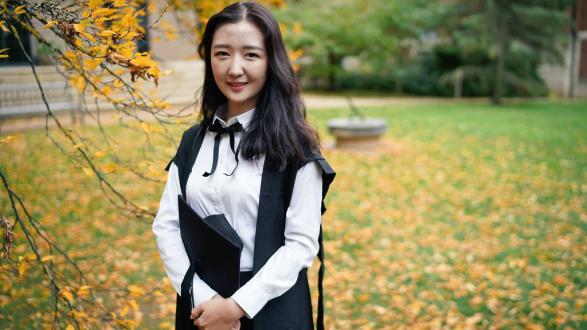Fast Facts about Lina Lee:
Hometown: Masan, South Korea
Degrees: B.A. (Hons.) in French from Jawaharlal Nehru University in Delhi, India, and MSc in Contemporary India from the University of Oxford
Fun Fact: Fluently speaks Korean, French, English, and Hindi
____________________
Pacific Council: How did you become interested in international affairs?
Lina Lee: My birthplace is a small city in South Korea called Masan, but I haven't actually lived there. I moved around a lot within and also outside of South Korea during my childhood. When I was 11, my family moved to India for my mom’s business, so I grew up there and gradually learned its culture, history, and religion.
At first I wasn’t too curious to learn more about India because I was already living there and I thought that was sufficient. But when I had a chance to take classes about India in college, I became interested in studying more about the country. I studied and lived in India for seven years, so I have an extensive background there. For my bachelor’s degree I studied French, then later I did my master’s in Indian studies at Oxford.
During my undergraduate studies the president of South Korea paid a visit to India, and I had a chance to help the embassy with the visit. I met officials and diplomats from both sides, which really inspired me pursue my career in state relations and foreign policy. That’s also when I decided I really wanted to study more about India, its relations with South Korea, and also foreign policy more broadly. Then, before coming to the Pacific Council, I did an internship at an Indian foreign policy think tank called Gateway House: Indian Council on Global Relations.
PC: How did you come to work at the Pacific Council and what are you working on here?
Lee: I applied through the Korea Foundation. The Pacific Council was recruiting someone to help with the SeouLA Forum, and also help the Pacific Council members to understand Korea. I thought it was a good opportunity for me because I have more or less studied only South Asia, but not East Asia and the United States. I wanted to learn more about my country and its relations with the United States.
Because the Pacific Council is situated outside of Washington, D.C., it has the chance to think outside the traditional conversations about U.S.-Korea relations.
During my six months here, I’m helping with research for SeouLA but I will also be training in different departments, such as Events, Membership, and Development. I also want to be involved in the Pacific Council’s various projects, such as the Mexico Initiative and the Global Water Scarcity project. I want to learn more generally about international affairs and also learn how the organization works here at the Pacific Council.
PC: What are your thoughts on the SeouLA Forum, having worked to develop it?
Lee: I think it’s very interesting and also pioneering in the sense that normally when people talk about U.S.-Korea relations they mostly talk about defense and security aspects, and that’s what most Washington-based think tanks do. Here, because the Pacific Council is situated outside of Washington, D.C., and it’s completely on the opposite side of the United States, it has the chance to think outside the traditional conversations about U.S.-Korea relations. So, instead of defense and security, SeouLA is about exploring technology, innovation, and the economy.
It’s going to be a great forum not just for leaders to engage and talk about policy concerns on those issues, but also for the public to actually think about what the advantages and benefits are of having economic relations between South Korea and the United States.
____________________
Read more about SeouLA 2017, made possible by the generous support of the Korea Foundation.




